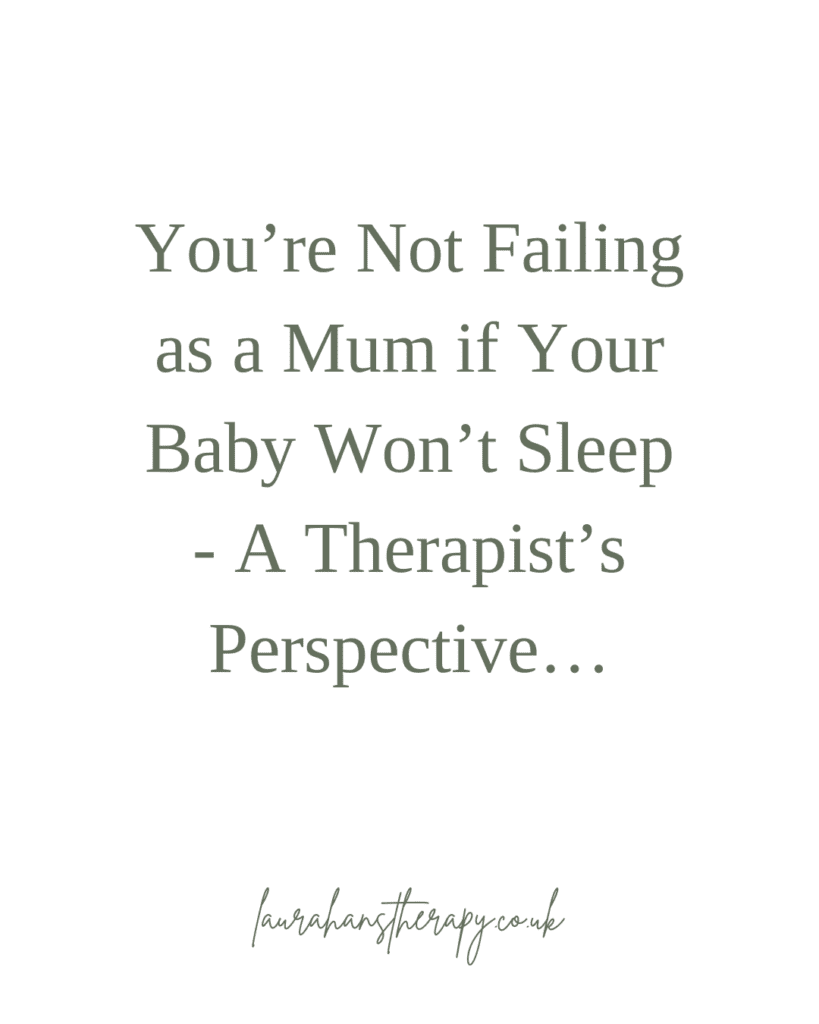You’re not failing as a mum if your baby won’t sleep. You’re experiencing one of the most challenging aspects of motherhood – sleep disruption. It feels hard because it is hard.
Sleep Disruption – A Universal Parenting Experience
Sleep disruption and deprivation is a common and expected experience for new mums. In the first few weeks and months, newborns have irregular sleep cycles, require frequent feeds, changes and comfort throughout the day and night. However normal this may be, coping with sleep disruption as a new parent can be tough, especially if you’ve experienced a difficult birth and/or you’re recovering from surgery.
This challenging period is a universal experience, but no two babies are the same. This means, when it comes to ‘mastering’ sleep, everybody’s journey will be different. Unfortunately, this doesn’t prevent people from comparing themselves to others and believing their ability as a mother is reflected in their child’s ability to sleep through the night.
All mums, but particularly new mums, are susceptible to this kind of guilt. Read 3 Things You Shouldn’t Feel Guilty About as a New Mum to learn more about counteracting some of these thoughts and feelings.
The Pressure for Babies to Sleep Through the Night
Sadly, there is a lot of societal pressure and unrealistic expectations around babies’ sleeping habits. It’s hard to avoid, especially when it comes to what we view and consume on social media.
Unlike any other previous generation of parents, we’re able to see what countless others are doing with their babies and children every day. In some instances, this can be a positive thing, but it often leads to comparison. For example, if you’re sleep deprived and struggling to get your child to settle most nights, seeing someone else whose baby has been sleeping 12 hours a night since they were three weeks old can easily make you feel like you’re doing something wrong.
Often, rather than blaming external factors, mothers blame themselves. Worse still, they view their struggles as evidence they’re failing as a mum. You can learn more about the impact of self-blame in How to Stop Blaming Yourself as a Mum.
In the western world, we encourage babies to self-soothe and self-settle from very early on. Some babies are able to do this automatically, and some babies can be trained to do so, but all babies are different and there are a lot of factors at play. For example, if your baby has a sensitive temperament, they may need more support or physical connection to fall asleep. In comparison, a baby with a calmer temperament may be able to settle themselves independently.
For a long time, misinformation around co-sleeping and the risk of Sudden Infant Death Syndrome (SIDS) added another layer of pressure for mothers who couldn’t get their baby to sleep on their own. Thankfully, we now know a lot more about safe ways to co-sleep. The Lullaby Trust is an excellent source of guidance and evidence-based information regarding safer co-sleeping.
Sleep Disruption and Maternal Mental Health
Sleep disruption and deprivation can have a huge impact on your mental health. Not only can it exacerbate symptoms of existing conditions such as anxiety and depression, but chronic sleep deprivation has also been linked to a higher risk of developing mental health conditions in the first place.
On a basic level, lack of sleep can disrupt the brain’s ability to regulate emotions, leading to increased irritability, emotional reactivity, and difficulty coping with the stress of everyday life and motherhood.
Personally, I need between seven and eight hours sleep a night. I can really tell the difference when I haven’t been able to achieve this for whatever reason. If, like me, you are someone who needs a certain amount of sleep to feel their best, having a new baby who wakes up to be fed, changed and looked after throughout the night is going to have an impact.
How to Manage When More Sleep Isn’t an Option
When getting more sleep simply isn’t an option, one of the best ways to manage is by practicing self-compassion. In other words, you need to treat yourself with kindness and gentleness.
When we’re struggling, being harsh and blaming ourselves can actually increase the emotional suffering we experience. In contrast, when we turn towards our suffering with a motivation to reduce it by caring for and nurturing ourselves, it can ease some of our distress. Listen to How Self-Compassion Can Help You as a Parent for more on this.
Speaking to yourself in a calm, gentle, nurturing tone is often the first step. For example, when you’re sleep deprived, self-compassion says…
‘Of course I feel snappy and irritable today – I saw every hour on the clock last night and I feel exhausted. How can I look after myself a bit more today? What do I need that will help me get through? How can I meet that need? Can I ask for support from someone to take the pressure off?’
Learning to Love Yourself
To learn more about practicing the art of self-compassion, download my free Learning to Love Yourself guide here >>> Learning to Love Yourself
Self-compassion takes time and practice, but this resource is designed to get you started. By signing up, you’ll also become part of my community, meaning you’ll be sent regular emails packed with valuable information and tips on managing your emotional wellbeing.
Get the Help You Need
If you’re struggling with your motherhood journey for any reason and it’s affecting your mental health, I can help. Reach out for the support you need by booking a consultation here. I also share lots of resources and encouragement via Instagram.
